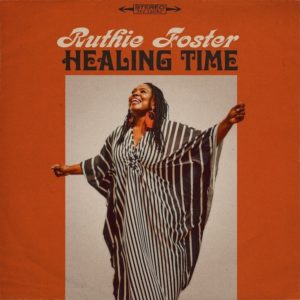If Healing Time, Ruthie Foster’s first studio album since 2017’s triumphant Joy Comes Back, were a musical, the title song would be the buoyant, raucous, gospel-stomp show-stopper—the moment at which our heroine not only realizes that living in joy is a choice, but emphatically makes that choice.
As it is, the song is the centerpiece of a soul tour de force, echoes of a gallery of greats, from Aretha to Irma to Marvin to Stevie to Dionne to Roberta, reverberating through the album. But, crafted at New Orleans’ Esplanade Studios and around Austin with producers Mark Howard and Dan Barrett; members of the Black Pumas; sacred-steel star Robert Randolph and Louisiana slide maestro Sonny Landreth, Healing Time is foremost a showcase for Foster’s own always-commanding voice and emotional immediacy.
Not to stretch the Broadway analogy, but this is a two-act production, opening with “Soul Searching,” a soaring soul-gospel curtain-raiser. Picture her on a busy street, people rushing by taking no notice as she wrestles with herself: “I ask myself the same questions, so many sleepless nights, how could I get it so completely wrong, when so many things were done so right?”
The wrestling plays out with “Lie Your Way to the Truth” and the self-recriminating “What Kind of Fool.” “What kind of fool would love you, what kind of fool would even try?” she sings, a stern, dark Stax-like march carrying her pained voice. The answer comes in redemptive faith (in God with “I Was Called,” in herself with “Paradise”) and hope for reconciliation (“Don’t Want to Give Up on You,” co-written with Grace Pettis).
Act Two, as it were, starts with that glorious title song, Randolph taking it all the way to church. Then the sun breaks through: The silky “For You” leads to “Love Is the Answer,” the latter sporting an effervescent Stevie Wonder-ish harmonica solo. A sense of resolve marks “The Finish Line,” featuring Landreth, flowering in the new-day anthem “Feels Like Freedom.”
The musical, er, the album closes with “4AM.” Here she’d be alone, sitting on a hotel bed, writing this song, lit by one dim overhead spot. And in fact, she did write it like that, in a hotel while on tour in Eastern Europe, distant from her daughter, her family, her friends. It’s a soft, somber coda, but one that pays homage to her ability to use her art to shine a light.
And speaking of homage, at the end of “Don’t Want to Give Up on You,” Foster casts a casual spoken aside, “Put another record on, baby,” with a little laugh, an offhand tribute to those classic artists who inform this album. But hey, throw on some Ruthie Foster too. How ’bout that for the curtain call?



